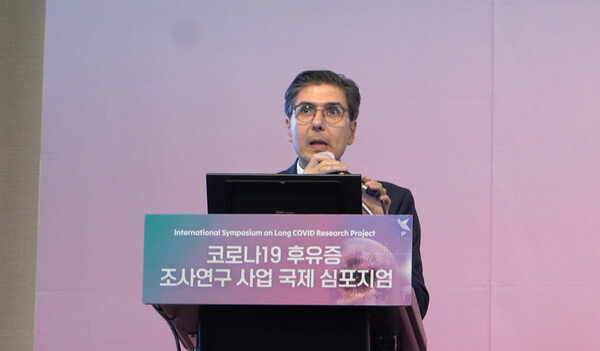As the need for responding to new infectious diseases is emphasized in the aftermath of the Covid-19 pandemic, calls are growing to find new solutions by researching “long Covid,” the term for the long-term effects of the disease.
Dr. Ziyad Al-Aly, Chief Research Officer at the St. Louis Health Care System in the United States, stated this during his keynote address at the “International Symposium on Covid-19 Long-Term Effects Research” held at the Sheraton Grand Incheon Hotel in Yeonsu-gu, Incheon, Korea, on Thursday.

He emphasized the need for international cooperation to address the impact of long Covid across health and society. This symposium was jointly hosted by Hallym University Medical Center, Korea University, and Asan Medical Center, in collaboration with the Covid-19 Long-Term Effects Research Office.
Long Covid began to be observed around March 2020, during the early stages of the Covid-19 pandemic. Even after recovering from Covid-19, reports of “health not fully returning to 100 percent” persisted. Symptoms varied widely, ranging from physical fatigue and muscle pain to “brain fog.” Research was conducted in various countries, including by Dr. Al Ali's team, confirming the reality of what patients referred to as “long Covid.”
Dr. Al-Aly defined long Covid as “the collective term for long-term sequelae appearing after Covid-19 infection.”
Just as the SARS-CoV-2 virus has had more dangerous and widespread effects than seasonal influenza, long Covid is also characterized by “a wide range of symptoms affecting the entire body.” Impacts have been confirmed on respiratory diseases, as well as cardiovascular, metabolic, gastrointestinal, and renal systems, and even neurological and psychiatric systems. According to this trend, 400 million people worldwide have experienced long Covid after Covid-19 infection.
Long Covid not only carries a high risk of leading to chronic diseases like diabetes but can also impair organ function, including the kidneys, potentially accelerating physical aging. These long Covid effects persisted even after one year, two years, and three years. This is why long Covid is defined as a “long-term” aftereffect.
“We are all within the scope of its effects (if we have ever had Covid-19).” Dr. Al-Aly stated,
As it is a symptom caused by Covid-19 infection, long Covid can also be prevented by vaccination.
“In the U.S., studies showing that Covid-19 vaccination reduces the likelihood of developing long Covid even if infected are lending weight to the argument that ‘Covid-19 vaccination is a wise choice,’” Dr. Al-Aly noted.
The same applies to treatment. Patients administered Paxlovid, a Covid-19 treatment, also saw a reduced risk of long-term side effects.
For this reason, Dr. Al-Aly believes long Covid research should be viewed as “one field within Covid-19 research” and should progress toward clarifying the link between acute infectious diseases and chronic conditions.
"Long Covid must be understood within the broader context of chronic diseases associated with acute infectious diseases. It's time to focus on the link between acute infections and chronic diseases, similar to research on shingles affecting dementia, post-Ebola syndrome, or post-polio syndrome," Dr. Al-Aly stated.
He also emphasized international solidarity in infectious disease research and response, including Covid-19 and long Covid. The aftermath of long Covid following Covid-19 infection extends beyond healthcare systems.
Dr. Al-Ayi expressed concern, stating, “The global economic loss from long Covid is estimated at $1 trillion annually (approximately 1,390 trillion won), equivalent to about 1 percent of global GDP. This has a significant detrimental impact on humanity's sustainable development.”
"New infectious disease pandemics will undoubtedly arrive. Just as long Covid followed Covid-19, new infectious diseases will also be followed by long-term sequelae after infection,” Dr. Al-Aly said. “We must strive to understand the mechanisms of infectious diseases through international cooperation and develop integrated response strategies in the fields of healthcare and policy."
Related articles
- Covid-19 is more deadly than flu, but Koreans’ awareness of its risk is low
- Moderna warns of low public awareness on Covid-19 vaccination amid rising hospitalization rates
- Over 270,000 Koreans have long Covid, but no government agency manages them
- Covid expert warns Korea and drugmakers not to waste the tools they’ve built

